Today, VLSI devices are found everywhere around us. We find advanced VLSI chips in our cars, cell phones, household appliances, cameras, medical devices and many other places. This rapidly evolving sector offers exciting opportunities in verification based jobs for those with strong fundamentals in electronic circuit design and hardware description languages, interest in VLSI design and verification and more importantly, the skill to put know-how of VLSI concepts to practice.
With the advances being made in technologies like process geometries, feature and product innovations on a daily basis, there is a constant need to design, develop and re-engineer integrated circuits (ICs). Since products like mobile phones are being released with new features in increasingly shorter cycles, there is a healthy demand for qualified very large scale integration (VLSI) engineers to work on these products. Therefore there is good scope for a career in the VLSI industry.
Opportunities in VLSI field
The VLSI field offers exciting growth opportunities for engineers who are strong in electronic design fundamentals, have an interest in VLSI design and verification and know how to apply VLSI concepts to practice. Harish Mysore, director, India operations, Global IEEE Institute for Engineers Private Limited, informs, “In the VLSI chip design and verification alone, 20,000 to 30,000 engineers are currently employed with over 200,000 engineers working in the broader semiconductor industry, including embedded systems development and board-level hardware design.”
According to Vivek Madhukar, COO, TimesJobs.com, VLSI professionals are always in high demand in the fast-changing chip designing industry. There are over 150 companies catering to this industry, including big names like Texas Instruments, Infineon, Freescale Semiconductor, Cadence, HCL, Intel, Lucent, Motorola, Philips Semiconductor, Qualcomm, Sasken, Conexant, Wipro and TCS, to name a few. He says, “A career in one of these companies is highly sought after and developing VLSI skills is a good way to make this dream a reality.”
demand in the fast-changing chip designing industry. There are over 150 companies catering to this industry, including big names like Texas Instruments, Infineon, Freescale Semiconductor, Cadence, HCL, Intel, Lucent, Motorola, Philips Semiconductor, Qualcomm, Sasken, Conexant, Wipro and TCS, to name a few. He says, “A career in one of these companies is highly sought after and developing VLSI skills is a good way to make this dream a reality.”
It is not easy to get into design
On the flip side, scope for a career in the design side of VLSI industry is currently somewhat limited as compared to other areas, feels Subhajit Sen, associate professor, International Institute of Information Technology, Bangalore, for three particular reasons. One, VLSI or chip design requires a deeper level of knowledge and skills than other electronics related fields. Two, VLSI chip design is expensive and requires access to high- cost, specialised electronic design automation (EDA) tools. Last, VLSI fabrication/prototyping is expensive and there is no commercial VLSI semiconductor manufacturing facility (foundry) in India.
K. Srinivasa Raju, CEO, Unistring Tech Solutions Pvt Ltd, informs that there are very few openings for jobs in analogue designing in the VLSI industry. He says, “The expectations in terms of the know-how of analogue complementary metal oxide semiconductor (CMOS) designs/issues are very high, which makes it difficult to get into analogue based VLSI companies. Most of the companies prefer to take M.Techs from only reputed institutes such as NITs/IITs.”
However, Sen believes, as India expands its electronics system design and manufacturing (ESDM) capabilities, the number of job opportunities is expected to grow in the VLSI design area.
Mostly verification based jobs in India
Jobs in this industry are broadly distributed in four areas: FPGA based embedded system design, embedded based small FPGA application development, application specific integrated circuits (ASIC) based designs and VLSI verification for FPGAs/ASICs/embedded based designs.
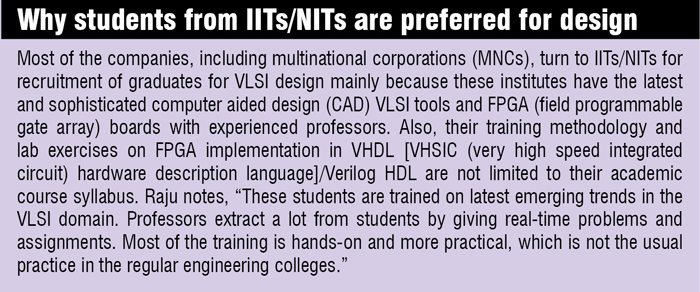
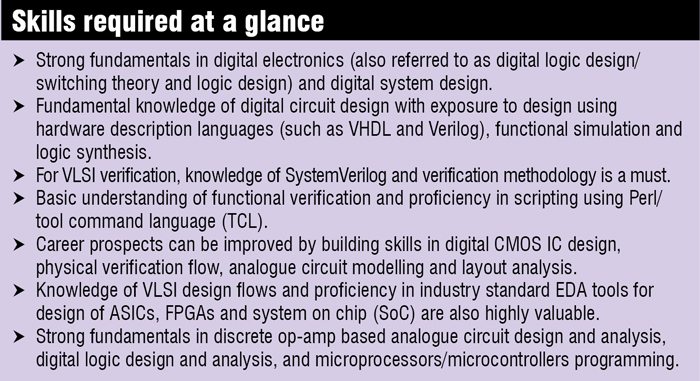
“Most of the jobs in the VLSI industry in India are verification based, particularly for ASIC designs,” informs Raju. To get into such companies, one must be good in SystemVerilog and unified verification methodology (UVM) or open verification methodology (OVM).” He adds, “Most of these verification based companies prefer M.Tech graduates specialised in VLSI design.”
Good opportunities for fresh graduates
There are many career opportunities in the VLSI industry today, especially at the entry-level roles targeted at fresh engineering graduates. “One needs to understand that VLSI, as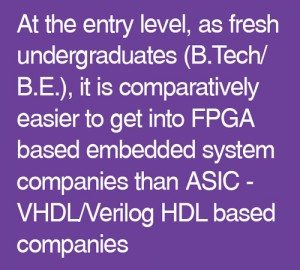 seen from textbooks, is not just limited to that. Skills such as digital domain and VHDL/Verilog HDL languages can be acquired that are used in FPGA based embedded system industry and also in ASIC companies,” says Raju.
seen from textbooks, is not just limited to that. Skills such as digital domain and VHDL/Verilog HDL languages can be acquired that are used in FPGA based embedded system industry and also in ASIC companies,” says Raju.
Excellent fundamentals in digital electronics, topped with knowledge in either VHDL or Verilog HDL, can easily get an engineer a job in FPGA based companies. Especially for an M.Tech graduate in VLSI, at entry level it is highly possible to get an opportunity to work at the design level in the VLSI industry.
Embedded system design companies that develop FPGA based embedded applications also have openings for fresh graduates. Raju notes, “At the entry level, as fresh undergraduates (B.Tech/B.E.), it is comparatively easier to get into FPGA based embedded system companies than ASIC-VHDL/Verilog HDL based companies.”
This field offers fresh engineering graduates opportunities in several stages of the VLSI chip design process too. “The biggest opportunities continue to be in the front-end register transfer level (RTL) design and verification with growing opportunities in logic synthesis and timing analysis, design for testability, physical design and verification, analogue and mixed signal CMOS IC design, CAD tools development, and hardware verification and validation,” according to Mysore.
Fresh graduates also have opportunities in field application engineering, technical support, and marketing and sales.
Although VLSI companies typically hire at M.Tech levels for VLSI design positions, candidates with good fundamentals in electronics, electrical or computer science engineering can find positions in areas such as testing and debugging of VLSI chips, informs Sen. He says, “Embedded software, which involves writing code for microcontrollers/processors embedded within VLSI chips, is also an active area of recruitment.”
“At our company, we recruit fresher graduates for working in the VLSI domain, provided they are good at the fundamentals of digital logic design (also referred to as digital electronics/switching theory and logic design), digital system design and have done their project implementation in either VHDL/Verilog HDL. We also give internships to M.Tech (in VLSI) students for their second year project work. For internships, we conduct written exams, technical and HR interviews,” shares Raju. He adds, “Currently, our team comprises more than ten engineers working in the field of VLSI. We are planning to recruit ten more for this year. Our recruitment procedure is always in internship mode.”
Pay package and demand areas
“During internship, we pay a stipend of anywhere between ` 4000 and ` 8000 per month, depending on the performance in the internship recruitment procedure. After completion of the internship/project-work, we offer the candidate a job in our company. The salary emolument is typically around Rs 144,000 to Rs 300,000 annually, depending on individual capabilities in technology,” informs Raju. Although, he maintains, MNCs pay double the amount of what they offer at Unistring.
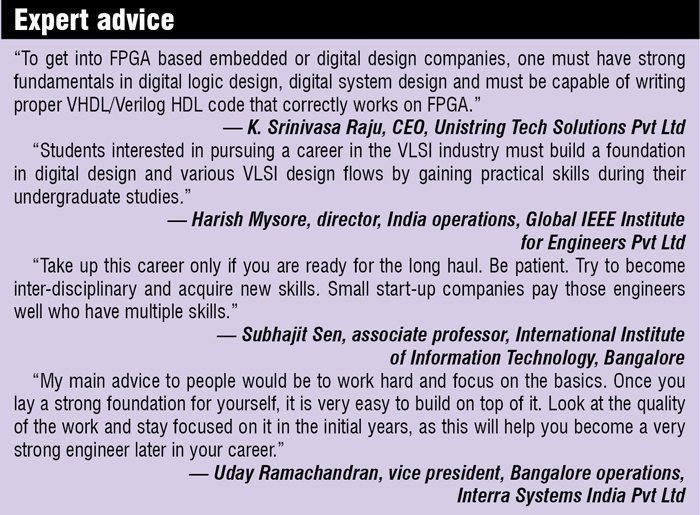
As a skill, chip designers form the cornerstone for electrical and computer engineering domains, and graduates from good institutes can command handsome starting salaries. As per figures provided by TimesJobs.com, 55 per cent of the engineers (basically feeshers) working in the VLSI domain are paid anywhere between Rs 120,000 and Rs 300,000 per annum. Twenty three per cent engineers draw anywhere between Rs 400,000 and Rs 700,000 per annum and 13 per cent of the (senior) engineers in this industry are paid nearly Rs 1 million and above.
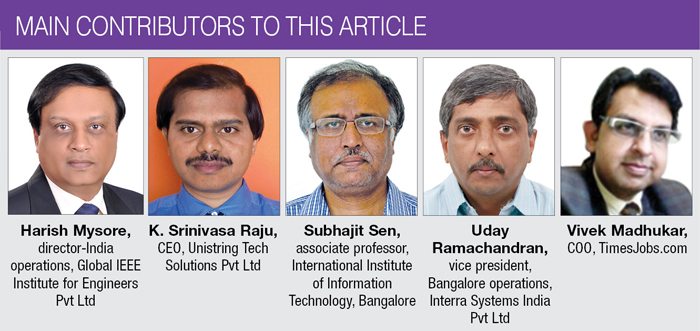
“The silicon valley of India, Bengaluru, accounts for a majority of the jobs, as most companies have their core technology centres based there, with Hyderabad, Delhi, Chennai and Pune accounting for other opportunities in the VLSI sector,” informs Madhukar.
In the near future
The VLSI industry is expected to grow rapidly in the next few years due to further reduction in geometry, reduced power requirements and very large-scale application-specific integrated circuits. As a result, continuous investments will be made by integrated device manufacturers in the semiconductor industry, in addition to the various steps taken by the Indian government to boost indigenous production of electronics in India to address rapid growth in the local demand for electronics. “Further, as a result of the increasing use of electronics in telecom, healthcare, automotive, industrial and office automation, and consumer goods, the need for advanced chip design and verification engineers in the semiconductor industry will further increase,” notes Mysore.
The article was originally published in November 2014 and has been recently updated.





Hello,
This is Shruti Savalagi, I have an experience as a trainee in ASIC Design and RTL Verification. I have good knowledge in Digital Design, Verilog, System Verilog, UVM, Timing analysis of a design (STA), Analog electronics, Basic C, OOPs concept, Perl and Scripting language.
Based on my abilities and attached resume. Please go through my resume.
Thanks and Regards,
Shruti Savalagi
Dear Shruti Savalagi, we do not accept resumes here on this website. Please submit your resume to http://jobs.electronicsforu.com
i have query related to your skills……….did you learn this by passion or in order to acquire a job in vlsi?………..one more thing it is all business……..never forget this word…………in order to maintain their startups………….these guys tell whatever their business meets…………….follow innovation…………..may be not now…………but one day ,it earns you more than anything in the world and it lasts forever……….best example is einstein
HI,
I am karthikeyan, plz give some ideas to place in vlsi company.
HI,
my daughter has completed M.Tech ( VLSI) , please give some ideas to place in VLSI Companies as fresher at Bangalore.
My friend got job in aricent with 4.5 lpa he did vlsi course from one inatitute in bangalore after his m.tech
From which institute he did the course? I am mtech in eee. Is it worth doing for placement?
yes i also want to know from which institute you did training
sir ,i am in class B.E. branch EC LAST YEAR .i will go to VLSI field so that givethe idea for VLSI field. THANKS
Kindly elaborate your query.
Hii sir !
Myself subha from chennai , I am completed my UG – B.E /ECE in 2017 batch . Now i am currently working in Eaton MTL instruments , chennai . I am very eager to work in VLSI design / industry .
Hi sir…
This is Karthika Raju from Chennai. I have completed M.E VLSI design in 2013 and worked as Assistant professor for 2.6 yrs. Now I’m not interested in teaching line and want to work in Electronics core industry. I want to know if I can get a job in core industry especially VLSI.pls help.
Hi sir,
This is Naveen from bangalore, I Have completed my Diploma in E & C. I have more than 10 years experience in IT service related to Display(LED & LCD), Testing departments. I am Interested and looking for VLSI design related jobs in bangalore. Let me know about the Job offers please.
Hello,
I am in final year BE in ECE stream, I am looking for career in semiconductor industry as a fresher how do I get into those companies?
Hello,
I have done my M.Tech in Telecommunications Systems Engineering and have 6+ years experience in telecom industry. for Multiple reasons and interest, I am planning to start learning VLSI concepts targetting Design Verification or UVM centric job areas. What are your suggestions to get started in this direction?
Please advice on this, if I plan to learn and start searching for career options in VLSI industry down the line in <1year timeline, will that gonna work?
Regards
Narendra
Hii sir !
Myself Gopikrishna from Bangalore , I am currently pursuing the 4th year of my UG – B.E /ECE . I have much interest in working with VLSI Industry but my aggregate is very poor(i.e.57%), will i get jobs in VLSI Industry if i do particular course. if not suggest me what to do further to get into VLSI Industry.
Hi Sir ,
I have completed my M.sc in electronics.
I have a query. Most of time companies specify qualification as B.E/B.Tech or M.Tech they don’t say anything about M.sc .
I want a job in this field and Did i can get a job in VLSI on my M.sc Electronics basis.
Where you did ASIC Design and RTL verification mam so that i could follow. I have completed my M.E in VLSI Design and looking for courses in VLSI please give some idea which course is useful for VLSI student.
I’m b tech EEE student this course eligible for me’
Hello sir,
I have completed my B.E -ECE and my main project is based on the VLSI domain. My project is designed by Cadence software in Analog domain. Can I get the job in Cadence?
Or can I get the jobs in VLSI company ?
can you please suggest me any job oriented training institute which has placement assistance?
I am kusuma i pursuied b.tech i intrested in VLSI design please tell me when you are starting course please help me can you please suggest me any job oriented training institute which has placement assistance?
Hai
I’m Hemasree and l had completed my graduation in electronics and communication stream after that l joined as Design Verification intern at Sion Semiconductors .how can l get a job in SoC verification in VLSI based company?